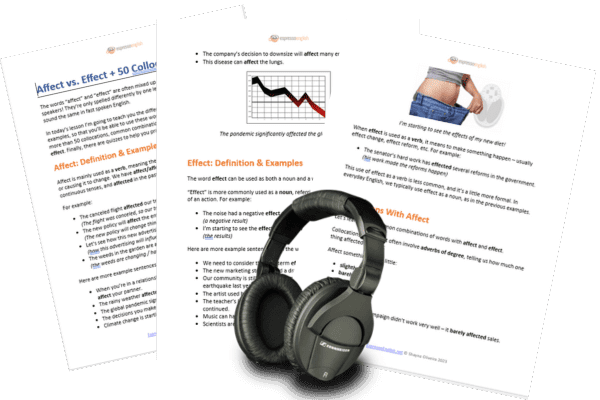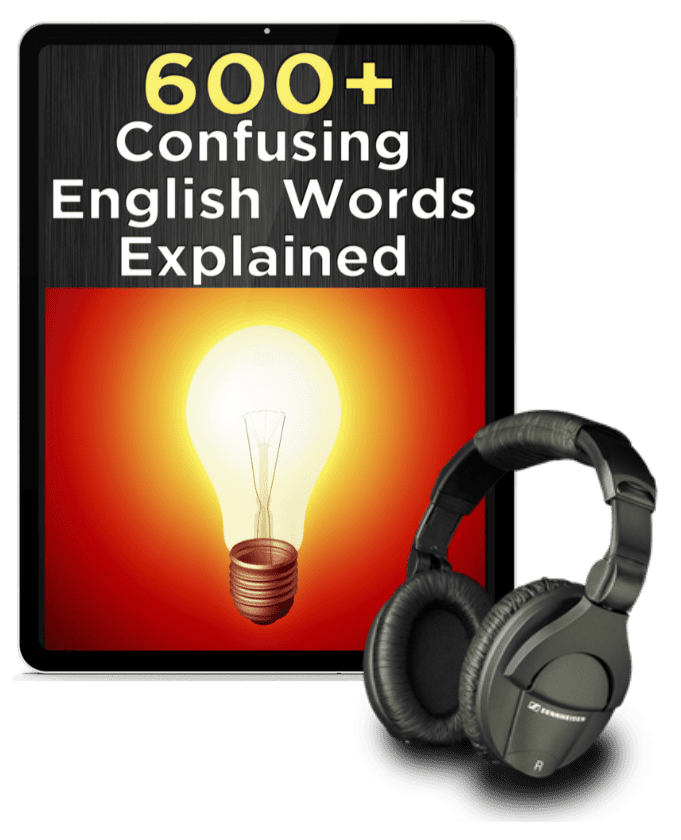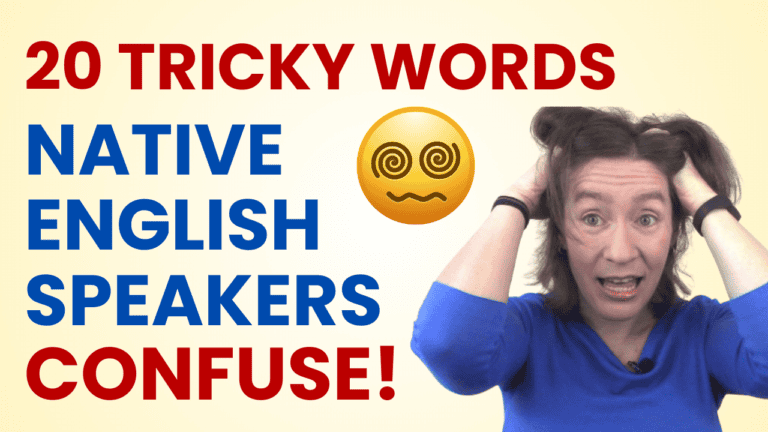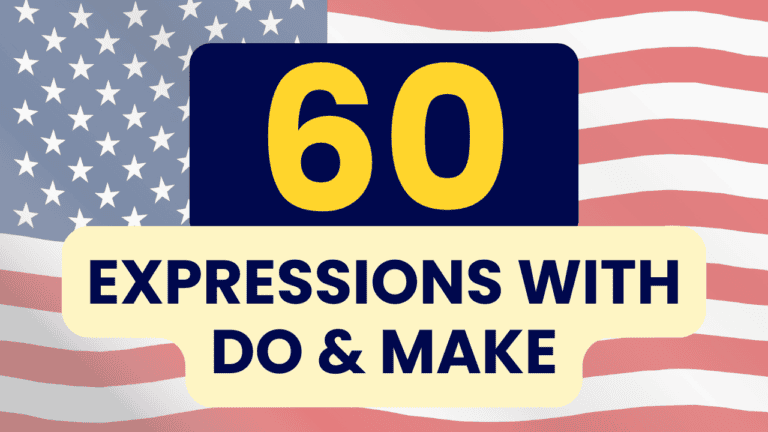
Knowing when to use affect vs. effect can be hard – let’s learn the difference with lots of examples!
The commonly confused words “affect” and “effect” are often mixed up – even by native English speakers – because of their similar spellings and pronunciation. They essentially sound the same in fast spoken English.
Affect: Definition & examples
Affect is mainly used as a verb, meaning the action of influencing something else or causing it to change. We have affect/affects in the present tense, affecting in continuous tenses, and affected in the past tense.
For example:
- The cancelled flight affected our travel plans.
(The flight was canceled, so our travel plans had to change) - The new policy will affect the entire company.
(The new policy will change things for the entire company) - Let’s see how this new advertising campaign affects sales.
(how this advertising will influence/change sales) - The weeds in the garden are affecting the growth of the flowers.
(the weeds are changing / having an impact on the flowers’ growth)
Here are more example sentences with the verb affect:
- When you’re in a relationship, you need to think about how your actions affect your partner.
- The rainy weather affected our outdoor plans, so we stayed indoors.
- The global pandemic significantly affected the economy.
- The decisions you make today will affect your future.
- Climate change is starting to affect wildlife habitats around the world.
- The company’s decision to downsize will affect many employees.
- This disease can affect the lungs.
Even more example sentences with affect
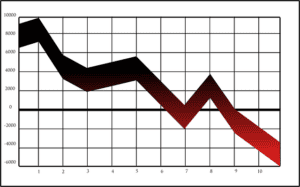
Effect: Definition & examples
The word effect can be used as both a noun and a verb.
“Effect” is more commonly used as a noun, referring to the result or consequence of an action. For example:
- The noise had a negative effect on my concentration.
(a negative result) - I’m starting to see the effects of my new diet – I’ve lost 5 pounds!
(the results)
Here are more example sentences with the word effect used as a noun:
- We need to consider the long-term effects of taking this medication.
- The new marketing strategy had a dramatic effect on sales.
- Our community is still suffering from the devastating effects of the earthquake last year.
- The artist used bright colors to achieve the desired effect in her painting.
- The teacher’s lecture had little effect on the students; their bad behavior continued.
- Music can have a calming effect on anxious animals.
- Scientists are studying the effects of pollution on the river wildlife.

When effect is used as a verb, it means to make something happen – usually effect change, effect reform, etc. For example:
- The senator’s hard work has effected several reforms in the government.
(his work made the reforms happen)
This use of effect as a verb is less common, and it’s a little more formal. In everyday English, we typically use effect as a noun, as in the previous examples.
Even more example sentences with effect
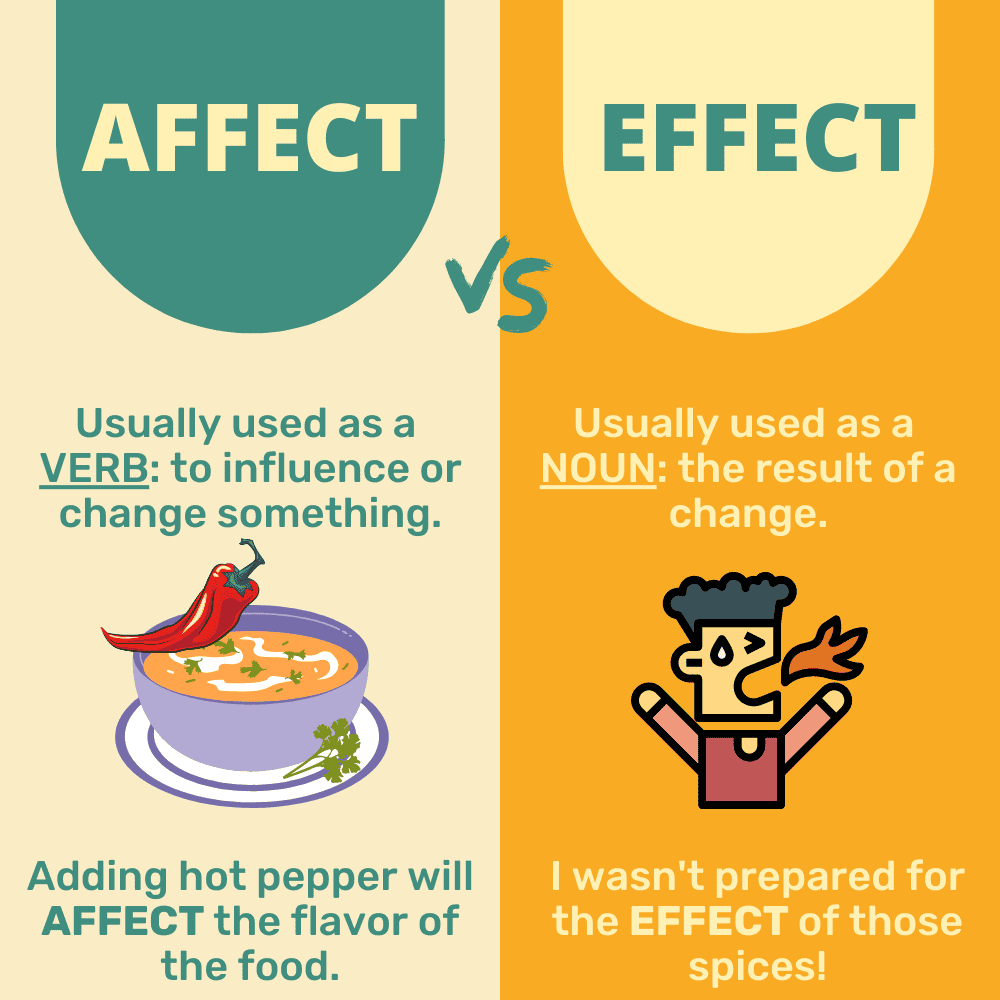
Collocations with affect
Let’s learn some collocations (common combinations of words) with affect and effect.
Collocations with affect often involve adverbs of degree, telling us how much one thing affected another:
Affect something only a little:
- slightly affect
- barely affect
- hardly affect
Examples:
- The marketing campaign didn’t work very well – it barely affected sales.
Affect something a lot:
- greatly affect
- radically affect
- significantly affect
- affect [something] very much
- deeply/profoundly affect
(this often has the connotation of affecting someone’s emotions)
Examples:
- Moving to a much bigger and more expensive house will greatly affect our budget.
- Losing his mother at such a young age profoundly affected his childhood.
A few more collocations with affect include:
- clearly affect (when the influence is obvious)
- directly / indirectly affect
- adversely affect (when the influence is negative)
- seriously / severely affect (used when the influence is large, and often negative)
- likely to / unlikely to affect
Examples:
- I’m always happy in the summer and depressed in the winter – the weather clearly affects my mood.
- The disease severely affected his vision, and he needed surgery to correct it.
- Switching jobs so often is likely to affect your reputation in the industry.

Collocations with effect
There are many more collocations with effect!
We have adjectives describing how big the change/result is:
Large result:
- a dramatic effect
- a powerful effect
- a profound effect
- a significant effect
- a strong effect
- a far-reaching effect
Small result:
- a modest effect
- a minimal effect
- a marginal effect
- a negligible effect (almost no impact/result)

We also have words telling us the result is clear and easy to see:
- a visible effect
- a noticeable effect
- a discernible effect
- a measurable effect
These adjectives tell us about how long the impact/result lasts:
- a short-term effect
- a long-term effect
- a residual effect (lasting some time after the event)
These adjectives are used for results that are bad:
- an adverse/harmful/ill/detrimental effect
- a destructive/damaging effect
- a catastrophic/devastating effect (extremely bad)
- a traumatic effect
- an undesirable/unfortunate effect

These adjectives are used for results that are good:
- the desired effect
- a beneficial effect
- a positive effect
- a magical effect
- a calming/soothing effect (means it makes you calm, or eases pain/discomfort)
- a curative/restorative/therapeutic effect (means it heals)
These words tell us about the probability that a result will happen:
- a possible/potential effect (this means maybe it will happen)
- a likely/probable effect (this means it probably will happen)
- a predictable effect (this means it was easy to guess/know that it would happen)
Here are some additional adjectives that are common collocations with effect:
- a side effect (not the main one, but an additional one)
- special effects (techniques used in producing movies/TV that are done by computers)
- a startling/striking/stunning effect (this means the result is surprising)
- a subtle effect (this means the result is present, but hard to notice)
- the overall effect (the general effect)
- personal effects (items that you usually keep on your body, like a watch, jewelry, keys, a wallet or purse)
- a domino effect (this means one thing causes another, which causes another, which causes another, etc.)
- a ripple effect (this is similar, meaning results that continue to spread)

Those were a lot of adjective collocations with effect… but we also have common collocations with verbs!
When something causes a result, we use these verbs:
- bring about / have / produce an effect
When someone is impacted by a result, we use these verbs:
- feel / experience / suffer from an effect (“suffer from” is negative)
Scientists often assess, determine, estimate, examine, measure, or study the effects of one thing on another.

If we want to make a result bigger, we would compound, maximize or magnify the effect.
If we want to make a result smaller, we would try to cushion, lessen, mitigate, reduce, or soften the effect.
Another set of verbs is used when we take action to produce the opposite result: counter, counteract, offset, or cancel out the effect.
We can talk about how long an effect lasts (continues in time). When it stops, the effect wears off.
Now you know when to use affect vs. effect, as well as some of their common collocations! Try to write your own example sentences with affect and effect using the correct word.
Remember – affect is a verb, an action word, talking about the process of influencing/changing something. Effect is usually used as a noun, talking about the result.
Again, in everyday speech, affect and effect are pronounced the same.
The English language has lots of confusing words, and you can learn a lot more of them in my e-book of 600+ Confusing English Words Explained!


